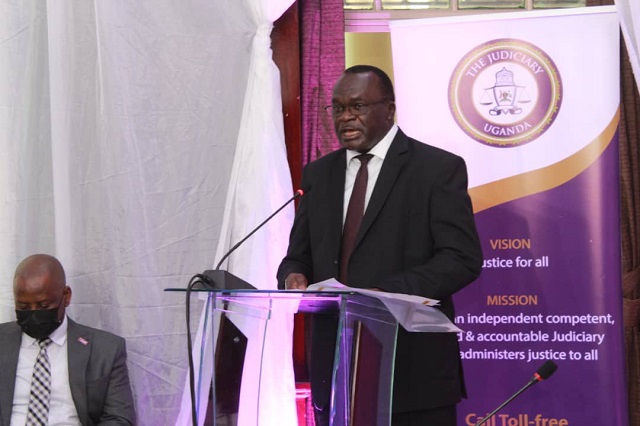Chief Justice Alfonse Owiny-Dollo has released the Judiciary Annual Performance Report for the Financial Year 2023/2024, providing a comprehensive overview of the institution’s achievements and challenges.
While releasing the report for the Financial Year 2023/2024, Owiny-Dollo said the report underscores the Judiciary’s commitment to transparency and accountability, while showcasing efforts to improve access to justice and overcome obstacles.
The Annual Performance Report of the Judiciary is a requirement under Section 39(1) of the Administration of the Judiciary Act, 2020 (AJA) and the Chief Justice is required to publish and release it annually covering all activities of the Judiciary during the Financial Year in issue.
In fulfillment with the requirement, the Chief Justice on Friday said the Judiciary received a total budget allocation of 392.545 billion shillings for FY2023/24, an increase from the 381.6 billion shillings allocated in the previous financial year.
Owiny-Dollo said this increased funding enabled the Judiciary to deliver on its mandate through various initiatives, including innovations in case management, law reforms, and embracing technology in justice delivery.
One of the notable achievements highlighted in the report is the completion of 239,431 cases out of a total caseload of 401,269.
This, the Chief Justice said, represents a significant reduction in the pending caseload, which stood at 161,838 cases by the end of the financial year.
The report attributes this progress to the effective implementation of Alternative Dispute Resolution (ADR) mechanisms, such as Plea-Bargaining, Small Claims Procedure, and Mediation.
The Plea-Bargaining Programme in particular, according to the report, recorded a 22% increase in cases disposed of, from 5,246 in FY2022/23 to 6,408 in FY2023/24. The Judiciary said that this initiative has helped decongest prisons across the country.
Additionally the Small Claims Procedure, rolled out to 203 courts, resulted in completion of 23,567 cases and the recovery of claims valued at 17,993,850,733 billion shillings.
However, case backlog remains a challenge because of limited numbers of Judges citing Namibia’s total population of 3 million people that is served by 35 Judges of the high court compared to Uganda, a country with 45.9 million people is served by 655 Judicial Officers.
By Our Reporter
11th Oct 2024
END

